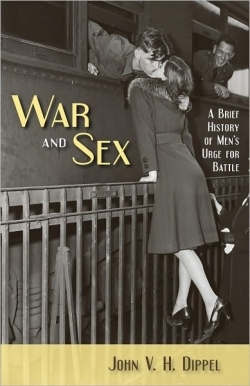War and Sex
A Brief History of Men's Urge for Battle
“War is a powerful aphrodisiac,” John V. H. Dippel writes. In this rich, far-reaching study of armed conflict since Abraham Lincoln’s time, Dippel discusses gender, women’s suffrage, and the demographics of marriage and birth, along with the erotic meaning of sex. An independent historian and authority on politics and society, Dippel authored Race to the Frontier and Two against Hitler as well as articles for Atlantic Monthly and The New Republic. His exhaustive research and careful writing make this a highly readable treasure of fact and interpretation. The topic could hardly be timelier, but its relevance will continue indefinitely. Notes and bibliography (a boon to researchers) take up nearly one third of the book.
In Lysistrata, Aristophanes portrays an organized protest against war: women refusing conjugal sex to frustrate warrior husbands. But that was “a comedy and a fantasy, not to be mistaken for real life.” Dippel views our Civil War as “The War Between the Sexes”—a threat to masculine values that hid behind the issue of slavery. Women did not win the right to vote until after World War I. That “War to End All Wars” began with notions of glory and ended in bewilderment about life and death, politics and leadership, male and female rights and roles. Two ex-corporals, Hitler and Mussolini, became national leaders in the war’s sequel. They held out a vision of male bonding and strength, set against the widespread revulsion toward national glory and personal sacrifice.
Addressing Islamic male dominance, Dippel reveals the fear and contempt in much of the Arab world toward sexual openness and growing female equality in the West. He presents a disturbing picture of sexual harassment of women in US military forces today, along with the growing importance of money in recruiting. With remarkable clarity he balances dry but important numbers with quotes from writers like D. H. Lawrence, Virginia Wolff, Erich Remarque, James Jones, and Adrienne Rich. “For many Americans,” he writes, “the lesson of Vietnam was the folly of vain, arrogant, and deluded male leaders and the terrible human cost of wars that were fought primarily to uphold their power.”
Reviewed by
E. James Lieberman
Disclosure: This article is not an endorsement, but a review. The publisher of this book provided free copies of the book to have their book reviewed by a professional reviewer. No fee was paid by the publisher for this review. Foreword Reviews only recommends books that we love. Foreword Magazine, Inc. is disclosing this in accordance with the Federal Trade Commission’s 16 CFR, Part 255.

